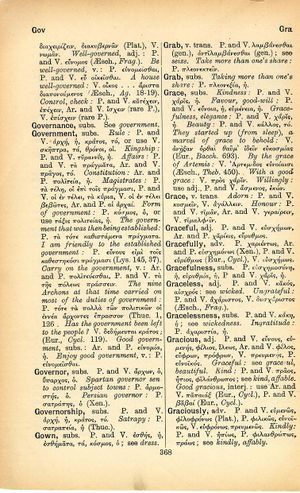government
Οὐ γὰρ ἀργίας ὤνιον ἡ ὑγίεια καὶ ἀπραξίας, ἅ γε δὴ μέγιστα κακῶν ταῖς νόσοις πρόσεστι, καὶ οὐδὲν διαφέρει τοῦ τὰ ὄμματα τῷ μὴ διαβλέπειν καὶ τὴν φωνὴν τῷ μὴ φθέγγεσθαι φυλάττοντος ὁ τὴν ὑγίειαν ἀχρηστίᾳ καὶ ἡσυχίᾳ σῴζειν οἰόμενος → For health is not to be purchased by idleness and inactivity, which are the greatest evils attendant on sickness, and the man who thinks to conserve his health by uselessness and ease does not differ from him who guards his eyes by not seeing, and his voice by not speaking
English > Greek (Woodhouse)
substantive
rule: P. and V. ἀρχή, ἡ, κράτος, τό, or use V. σκῆπτρα, τά, θρόνοι, οἱ.
kingship: P. and V. τυραννίς, ἡ.
affairs: P. and V. τὰ πράγματα, Ar. and V. πρᾶγος, τό.
constitution: Ar. and P. πολιτεία, ἡ.
magistrates: P. τὰ τέλη, οἱ ἐπὶ τοῖς πράγμασι, P. and V. [[οἱ ἐν τέλει, τὰ κύρια, V. οἱ ἐν τέλει βεβῶτες]], Ar. and P. αἱ ἀρχαί.
form of government: P. κόσμος, ὁ, or use τάξις πολιτείας, ἡ.
the government that was then being established: P. τὰ τότε καθιστάμενα πράγματα.
I am friendly to the established government: P. εὔνους εἰμὶ τοῖς καθεστηκόσι πράγμασι (Lys. 145, 37).
carry on the government. v.: Ar. and P. πολιτεύεσθαι. P. and V. τὰ τῆς πόλεως πράσσειν.
the nine Archons at that time carried on most of the duties of government: P. τότε τὰ πολλὰ τῶν πολιτικῶν οἱ ἐννέα ἄρχοντες ἔπρασσον (Thuc. 1, 126.)
has the government been left to the people? V. δεδήμευται κράτος; (Eur., Cyclops 119).
good government, subs.: Ar. and P. εὐνομία, ἡ.

